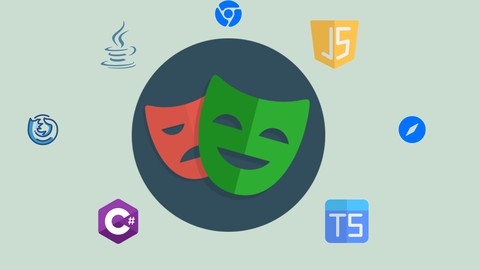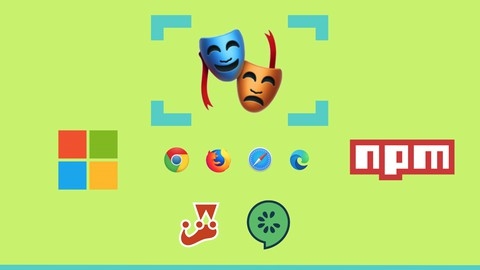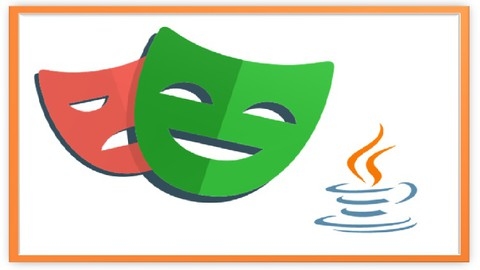Playwright is a powerful automation testing tool for modern web applications.
It enables you to write reliable and maintainable tests across various browsers, including Chrome, Firefox, and WebKit.
Playwright supports a wide range of automation tasks, from simple element interactions to complex end-to-end testing scenarios.
Learning Playwright can open doors to exciting career opportunities in software testing and quality assurance.
Finding the perfect Playwright course on Udemy can be challenging with so many options available.
You want a course that’s comprehensive, engaging, and taught by experts, ensuring you gain practical skills and real-world knowledge.
We’ve scoured the platform and recommend Playwright JS Automation Testing from Scratch with Framework as the best course overall.
This course provides a comprehensive learning experience, guiding you from the basics of Playwright setup to advanced topics like framework design and CI/CD integration.
It’s packed with practical exercises and real-world examples, ensuring you can apply your knowledge to real-world scenarios.
This is just one of the many fantastic Playwright courses on Udemy.
Keep reading to explore our recommendations for different learning styles and goals, whether you’re a beginner or an experienced tester looking to expand your skillset.
Playwright JS Automation Testing from Scratch with Framework
The course covers a comprehensive range of topics to help you master Playwright, a modern automation testing tool.
You’ll start by learning the core concepts of Playwright, including setting up the environment with Node.js and Visual Studio.
The course dives deep into Playwright’s features, configuration file, and running tests across multiple browsers like Chrome, Firefox, and WebKit.
One of the standout aspects is the extensive coverage of Playwright’s basic methods for web automation testing.
You’ll learn how to work with locators, extract text, handle UI components like dropdowns and radio buttons, and wait for dynamic elements.
The course also introduces you to powerful tools like Playwright Inspector, Codegen, and Trace Viewer for debugging and recording scripts.
You’ll get hands-on experience with end-to-end web automation practice exercises, covering scenarios like finding products, placing orders, and validating order history.
The course delves into Playwright’s unique GetBy locators, handling calendars, web dialogs, frames, and event listeners.
API testing is a crucial aspect, and this course teaches you how to integrate API calls with web tests using Playwright’s request method.
You’ll learn to parse responses, pass tokens to browser storage, and create a mix of web and API tests to reduce test time.
The course also covers advanced topics like session storage, intercepting network requests and responses, visual testing, handling file uploads and downloads with Excel utilities, and implementing the Page Object Pattern for better test organization.
With a focus on robust framework design, you’ll explore project configurations, test retries, parallel and serial execution, test tagging, HTML and Allure reporting, and CI/CD integration with Jenkins.
Additionally, the course introduces you to the Cucumber framework and its integration with Playwright.
To top it off, the course includes a comprehensive section on learning JavaScript fundamentals from scratch, ensuring you have a solid foundation for automation testing.
Playwright: Web Automation Testing From Zero to Hero
You’ll begin by setting up your development environment and cloning a test application.
The course then dives into JavaScript fundamentals, covering variables, data types, operators, conditionals, loops, and functions.
You’ll also learn about objects, arrays, and classes, ensuring you have a solid foundation.
Once you’ve mastered the fundamentals, the course introduces you to Playwright, a powerful web automation tool.
You’ll learn how to install Playwright, execute tests via CLI and UI, and debug using the Trace View.
The course covers test structure, hooks, and flow control, ensuring you understand the core concepts.
As you progress, you’ll learn how to interact with web elements using locators, extract values, and write assertions.
The course covers input fields, radio buttons, checkboxes, lists, dropdowns, tooltips, dialog boxes, and web tables.
You’ll even learn to work with date pickers, sliders, and drag-and-drop functionality with iFrames.
The course emphasizes the importance of the Page Object Model, teaching you how to create and manage page objects effectively.
You’ll also learn how to work with APIs, mock responses, and share authentication state.
Advanced topics include NPM scripts and CLI commands, test data generation, test retries, parallel execution, screenshots and videos, environment variables, configuration files, and fixtures.
You’ll even learn about project and global setup/teardown, test tags, mobile device emulation, and reporting.
Additionally, the course covers visual testing, running Playwright with Docker containers, and integrating with GitHub Actions and Argos CI.
Throughout the course, you’ll work on practical exercises to solidify your understanding.
Automated Software Testing with Playwright
The course covers everything you need to become proficient in automated software testing with Playwright.
You’ll start with the fundamentals of Playwright, learning how to set up your project, interact with web elements, handle inputs, and make assertions.
The course then dives into more advanced topics like configuration, reporters, screenshots, hooks, and custom functions.
One of the standout features is the comprehensive end-to-end testing project.
You’ll learn to create E2E tests for various scenarios like login/logout, feedback forms, search, fund transfers, filtering transactions, and even currency exchange.
The course also covers the powerful Page Objects Model pattern, which helps you write more maintainable and readable tests.
You’ll learn how to create page models, implement them in your tests, and even use them with visual regression testing using Percy.io.
Speaking of visual regression testing, the course dedicates an entire section to this crucial aspect of modern web testing.
You’ll learn how to create visual tests, take full-page and single-element snapshots, and update snapshots when needed.
For those interested in API testing, the course has you covered with a dedicated section on REST API testing.
You’ll learn how to configure API tests, make GET, POST, PUT, and DELETE requests, and parse JSON responses.
The course goes beyond just testing by covering CI/CD integration with Jenkins.
You’ll learn how to download and run the Jenkins server, create builds, and even set up parameterized builds.
Additionally, you’ll explore advanced tips and tricks like test info objects, skipping browsers, fixme annotations, retries, parameterized tests, mouse movement simulation, multiple browser pages, device emulation, generating PDFs and custom screenshots, and even emulating browser language and timezone.
If you’re interested in Behavior-Driven Development (BDD), the course covers both Cucumber and CodeceptJS frameworks with Playwright.
You’ll learn how to set up BDD projects, write features, create step definitions, use page objects, and even generate HTML reports.
For those looking to venture into web scraping, there’s a dedicated section covering scraper scripts, browser setup, setting user agents, and storing scraped data into files.
The course even touches on third-party test runners like Mocha, Jest, and Ava, ensuring you’re well-prepared for any testing environment.
Lastly, the course includes an interview preparation section, covering topics like self-presentation, testing knowledge, coding and automation, and even HTML and JavaScript for testers.
Playwright with Python for Web Automation Testing + Visual
You’ll start by setting up your development environment, including installing Python, the PyCharm IDE, and creating your first project.
The course covers Python fundamentals like data types, control structures, lists, dictionaries, and functions, ensuring you have a solid grasp of the language.
Moving on, you’ll learn about object-oriented programming (OOP) concepts in Python, as well as working with modules, packages, and the standard library.
The course then dives into Playwright, a modern and powerful browser automation library.
You’ll learn how to install Playwright, troubleshoot installation issues, and understand its benefits over other tools.
One of the course’s strengths is its focus on practical examples.
You’ll record and play your first test with Playwright, debug with the pause() method, and learn about locators, assertions, and waits.
The course covers the Page Object Model (POM) design pattern and project structure, helping you write maintainable and scalable tests.
The pytest framework is introduced, covering test organization, markers, fixtures, and reporting.
You’ll learn how to run tests in parallel and integrate with CI/CD tools like GitHub Actions.
Data-driven testing techniques are covered, allowing you to test multiple scenarios efficiently.
Advanced topics include authentication scenarios, testing chat applications with multiple users, browser authentication, and visual testing with snapshot comparisons.
The course even covers masking dynamic page elements and adjusting comparison strictness for visual tests.
Throughout the course, you’ll work with tools like GitHub, Notion, PyCharm, and .env files for managing sensitive data.
Playwright - Complete Beginner Course 2024 (UI + API)
You’ll start by learning the fundamentals of Playwright, including installation, setup, and configuration.
The course then dives into writing tests, covering various locator strategies like CSS, text, and XPath selectors.
You’ll explore assertions, both hard and soft, to validate your tests’ behavior.
The course also covers file uploads, wait commands for handling asynchronous operations, and debugging techniques like the Playwright Trace Viewer and Inspector.
As you progress, you’ll learn the Page Object Model for organizing tests and the Component Model for reusable UI components.
The course emphasizes optimizing your test framework with ESLint, reusing base URLs, randomizing data, and parameterizing tests.
You’ll also learn authentication strategies, including handling multiple signed-in roles.
Parallel and cross-browser testing are covered, ensuring your tests run efficiently across different environments.
Reporting is a crucial aspect, and the course guides you through built-in reporters, setting up Allure Reporter, and integrating with GitHub Actions for continuous integration.
API testing is also covered, with examples of GET and POST requests, controller setup, and API integration within tests.
The course includes a demo project where you’ll apply the learned concepts to a real-world scenario, working with assertions, locators, page objects, and handling new tabs.
Finally, you’ll explore mobile automation with WebdriverIO and Appium, expanding your testing capabilities to mobile applications.
Automated Web Testing with JavaScript and Playwright
The course takes a hands-on approach, guiding you through setting up the required software like Node.js, Visual Studio Code, and git bash (for Windows users).
You’ll learn the fundamentals of Playwright, a powerful web automation framework, by building a custom web application from scratch.
Right from the start, you’ll dive into project setup with npm init and explore the Playwright framework.
You’ll learn about functions, selectors, and page interactions, allowing you to automate tasks like clicking buttons and asserting text changes.
The course covers end-to-end testing techniques, including page objects, accessing specific elements, and handling string conversions.
As you progress, you’ll tackle more advanced concepts like nested page object method calls, navigating with the navigation bar, iterating over multiple elements, and working with dropdowns and regular expressions.
The course also covers form fields, third-party dependencies, method arguments, and data abstraction techniques.
One of the standout features is the emphasis on real-world scenarios.
You’ll learn how to handle iframes, simulate typing with the Keyboard API, and work with in-built retries for tasks like counting elements and handling text changes.
The course even covers mobile viewport setup, conditional actions for mobile devices, and utility functions for mobile navigation drawers.
The course delves into advanced techniques like handling cookies and browser storage, interacting with API/network requests (including JSON handling), injecting cookies into the browser, and using reusable API helpers.
You’ll also learn about environment variables, globalSetup for executing functions before tests, and mocking network requests.
Importantly, the course covers essential tools like GitHub and GitHub Actions for version control and continuous integration (CI).
You’ll learn how to set up GitHub authentication with SSH keys, prepare your project for GitHub, and configure GitHub Actions pipelines for executing tests.
Test Automation for Beginners [Selenium-Cypress-Playwright]
The course starts with an introduction to test automation and Selenium WebDriver, covering installation, creating scripts, and navigating browsers.
You’ll learn Java basics like variables, data types, and printing messages.
Next, you’ll dive into element locator techniques, finding elements using different strategies like IDs, names, XPath, and CSS selectors.
The course covers TestNG for managing tests, including annotations, XML files, and priorities.
Moving on, you’ll explore Cypress, learning its structure, setup, and writing your first test.
You’ll work with assertions, locators, configuration, and customization in Cypress.
The main focus is on Playwright, a modern test automation tool.
You’ll install Playwright, write your first test, and learn important CLI commands.
The course covers clicking elements, writing commands, annotations, focusing/skipping tests, tagging, and grouping.
You’ll configure Playwright globally and locally, record videos, take screenshots, set up base URLs, and use hooks.
You’ll master Playwright selectors, XPath locators, assertions, debugging with the Inspector, and recording tests with the Test Generator.
Authentication, emulating devices, using Traceviewer, and other emulation options are covered.
The course explores local configuration, CLI options, parallelism, sharding, retry options, and timeouts.
Hands-on examples teach dealing with checkboxes, drag and drop, dropdowns, iFrames, file downloads/uploads, generating PDFs, hovering, auto-waiting, and dialogs.
You’ll learn about installing browsers, NPX options, opening browsers, handling other input fields, and key presses/shortcuts.
Taking screenshots through the CLI is also included.
End to End Test Automation with Playwright (TS/C#/Java)
You’ll start by learning how to install and set up Playwright, both in Visual Studio Code and via the command line.
The course then dives into the building blocks of Playwright, teaching you how to write code using JavaScript and TypeScript.
You’ll learn about locators, which are essential for interacting with web elements, and how to use different locator strategies like CSS, XPath, and ARIA.
One of the standout features of this course is its coverage of Playwright Test, a powerful testing framework.
You’ll learn how to write tests using Playwright Test, leverage its hooks and BDD-style descriptions, and run tests in parallel for faster execution.
The course also covers test configurations, allowing you to customize your testing environment and reporting options.
The course goes beyond just testing and explores other features of Playwright.
You’ll learn how to record videos and take screenshots during test execution, perform file uploads, and even generate PDFs from web pages.
Additionally, you’ll dive into advanced topics like network interception, allowing you to mock API responses and build your own ad blocker.
The course also covers integration with popular tools like GitHub Actions, Azure DevOps, and Docker, ensuring you’re prepared for real-world scenarios.
You’ll learn how to set up continuous integration pipelines and leverage features like sharding for parallel execution across multiple machines.
Whether you’re interested in testing modern web applications, automating browser interactions, or exploring Playwright’s advanced capabilities, this course has you covered.
Web Automation and Testing using Playwright
You’ll start with an introduction to Playwright, covering its setup and core concepts.
From there, you’ll dive into interacting with web elements, handling navigation, and working with assertions.
The course doesn’t stop there - it covers a range of Playwright features like capturing screenshots, handling multi-page scenarios, and emulating different devices and environments.
You’ll also learn how to debug your tests using tools like the Playwright Inspector and interactive playground.
But what sets this course apart is its comprehensive coverage of different test frameworks.
You’ll explore Playwright Test, Jest-Playwright, and even Junit for Java, learning how to set them up, configure them, and leverage features like parallelism and reporting.
The course goes beyond just testing, teaching you how to enhance your tests with techniques like the Page Object Model, data-driven testing, and even integrating with Cucumber for behavior-driven development.
You’ll also learn how to troubleshoot tests and generate comprehensive reports using tools like Allure Report.
Additionally, the course covers continuous integration with popular platforms like GitHub Actions, Azure DevOps, and GitLab.
For those new to programming, the course includes a section on JavaScript for testers, covering topics like Node.js, NPM, arrow functions, and even testing frameworks like Mocha and assertion libraries like Chai.
Master Microsoft Playwright with Core Java(Basics + Advance)
You’ll start by understanding what Playwright is and how it compares to other test automation tools like Selenium and Cypress.
The course covers Playwright’s architecture, helping you grasp its inner workings.
Once you’ve set up the development environment with Java JDK, Maven, and Eclipse IDE, you’ll dive into coding your first Playwright test.
The course guides you through essential tasks like maximizing browser windows, launching different browsers, and utilizing navigation methods.
You’ll learn to interact with web elements using various locator strategies and handle common UI components like dropdowns, links, and checkboxes.
The course also covers more advanced topics like handling JavaScript alerts, frames, tabs, mouse gestures (hover, drag-and-drop), and shadow DOM elements.
The course equips you with skills to automate keyboard and JavaScript execution within tests.
You’ll learn to upload and download files, handle authentication, capture screenshots and videos, and use Playwright’s built-in trace viewer for debugging.
Assertions and handling web tables are covered, ensuring you can validate test results effectively.
Utilities like properties files, logging (Log4j and Log4j2), Excel reading, Java Mail API, and JDBC connections are also explored.
The course introduces the TestNG framework, covering its configuration, annotations, reporting, parameterization, parallel execution, and more.
You’ll work on assignments to solidify your learning.
Two live projects follow: a hybrid (data and keyword-driven) framework and a Page Object Model framework.
These projects integrate Git, GitHub for version control, and Jenkins for Continuous Integration.
The course then dives into Cucumber BDD, covering feature files, step definitions, runners, reporting, parameterization, hooks, and designing a Cucumber BDD framework.
Finally, you’ll receive detailed training on Core Java fundamentals like classes, objects, data types, operators, loops, arrays, OOPS concepts, exception handling, and collections.
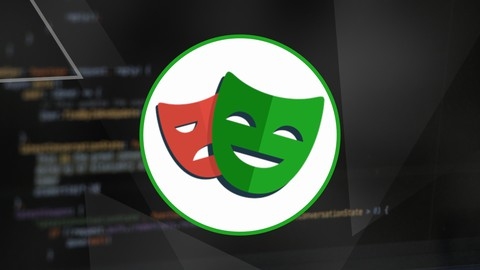


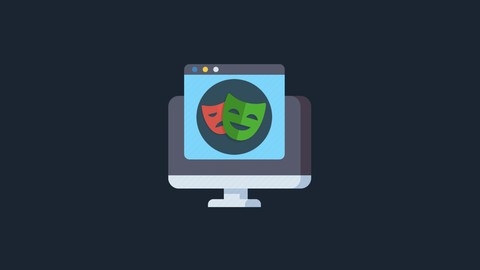

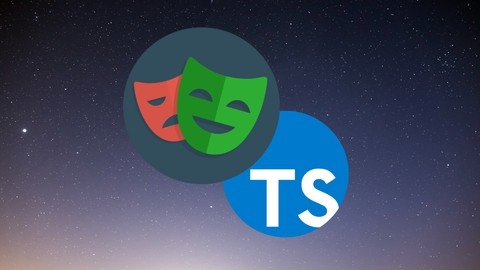

![Test Automation for Beginners [Selenium-Cypress-Playwright]](/img/best-playwright-courses-udemy/4827766_TestAutomationforBeginnersSelenium-Cypress-Playwright.jpg)
